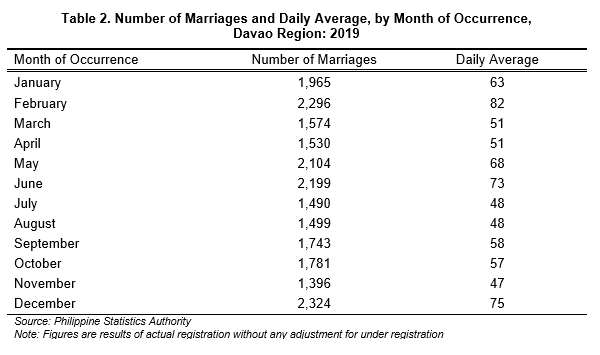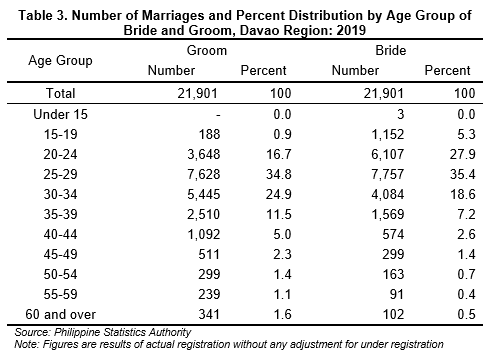Release Date :
Reference Number :
2021-01A
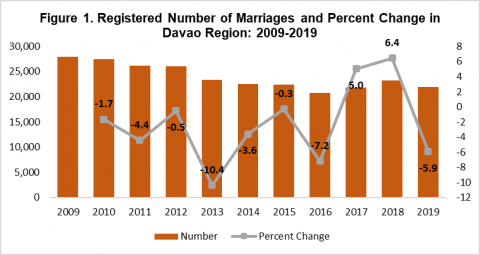 Increasing number of Marriages
Increasing number of Marriages
The number of marriages in Davao Region showed a decreasing trend from 2009 to 2016. It is interesting to note that from 2016 to 2018, the number of marriages in the region was on an increasing trend. From 2018 to 2019, it decreased by 5.9 percent (Table 1 and Figure 1).
In 2019, Davao Region recorded a total of 21,901 registered marriages.
Most number of couples married in December
Most number of marriages in 2019 occurred in December with 2,384 (10.6% of the total marriages in the region). It was followed by the months of February and June with 10.5 percent and 10.0 percent, respectively (Table 2).
On the other hand, the least number of marriages was recorded in November with 1,396 or 6.4 percent of the region’s total marriages.
On the average, Davao Region was reported to have 60 solemnized marriages daily in 2019.
Highest occurrence of marriages in Davao City
Among the provinces and Highly Urbanized City in Davao Region, Davao City recorded the highest number of marriages in 2019 at 7,871 which accounted for 35.9 percent of total marriages registered in the region (Figure 2). This was followed by Davao del Norte with 5,329 marriages (24.3%).
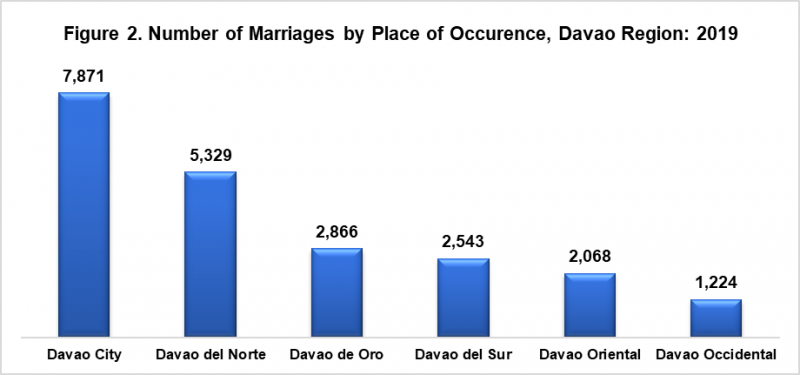
The provinces of Davao de Oro, Davao del Sur, and Davao Oriental had registered marriages of 2,866 (13.1%), 2,543 (11.6%) and 2,068 (9.4%), respectively.
Davao Occidental, on the other hand, had the least registered number of marriages at 1,224 or 5.6 percent of the region’s total marriages.
Most men and women in Davao Region married between ages 25-29 years old
Men marry at an older age compared to women. The reported median age for men is 29 years old while that for women is 27 years old (Figure 3).
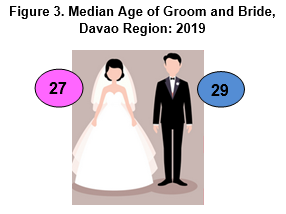
Most men married at ages 25 to 29 years old, which accounted for 34.8 percent of the total number of grooms in the region. Most women also married at 25 to 29 years old, representing 35.4 percent of the total number of brides (Table 3 and Figure 4).
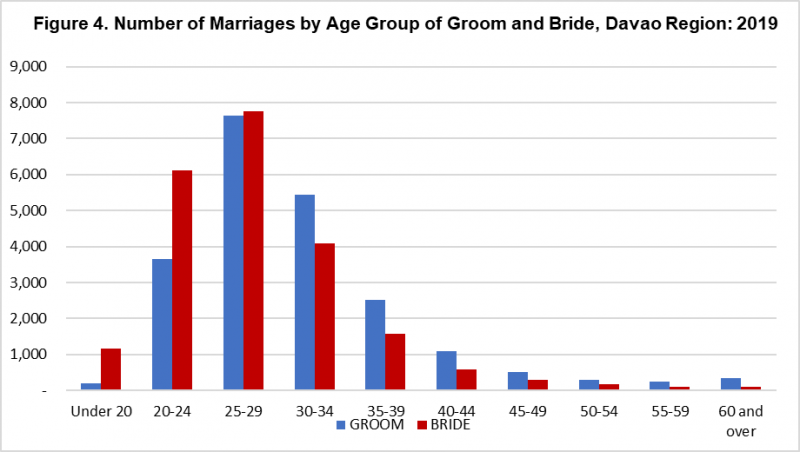
The number of men aged 60 years old and over, who got married in 2019 regardless of their previous marital status, was more than three times higher compared to that of women of the same age group.
Meanwhile, the percentage of teenage brides (1,155 or 5.3 percent) was more than six times higher than that of the teenage grooms.
On the average, there were three (3) teenage brides solemnized daily in 2019.
EXPLANATORY NOTES
Data on marriages presented in this release were obtained from the Certificates of Marriage (Municipal Form No. 97) that were registered at the Office of the City/Municipal Civil Registrars in Davao Region and forwarded to the Philippine Statistics Authority. Information presented includes registered marriages which occurred from January to December 2019.
Marriage is a special contract of permanent union between a man and a woman entered into in accordance with law for the establishment of conjugal and family life.
SUPPORT THE 2015-2024 CRVS DECADE
President Benigno S. Aquino III signed Proclamation No. 1106 on August 20, 2015 which declared the years 2015 to 2024 as Civil Registration and Vital Statistics Decade (CRVS). Said proclamation is a concrete manifestation of the Philippine government’s support to the outcome of the Ministerial Conference on CRVS in Asia and the Pacific held in November 2014 in Bangkok, Thailand.
RUBEN D. ABARO, JR., CESE
Regional Director
STATISTICAL TABLES

